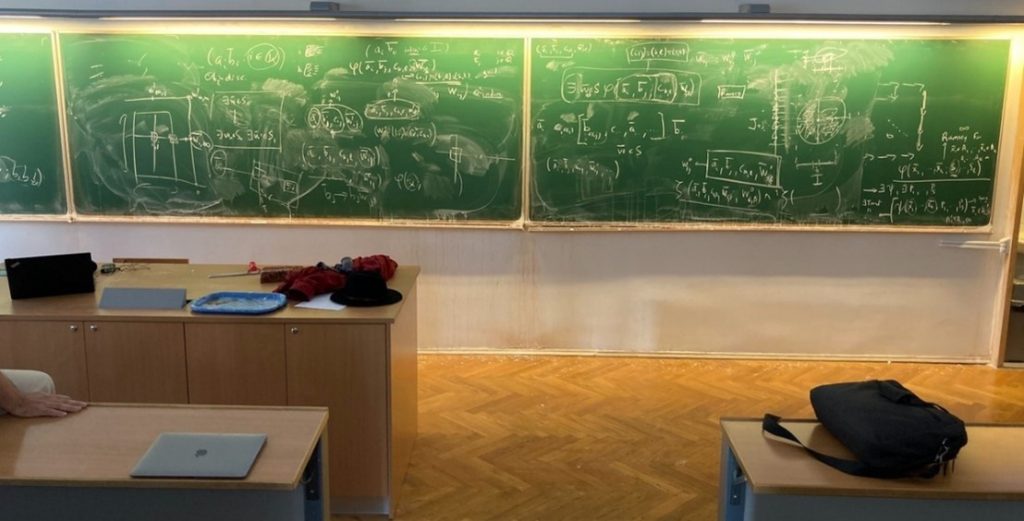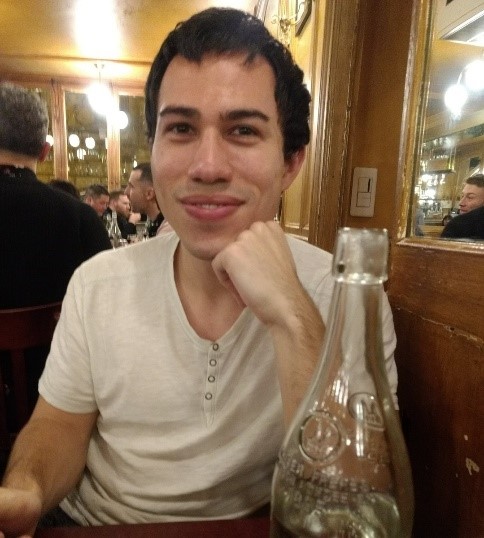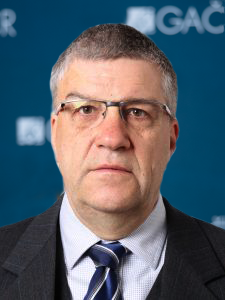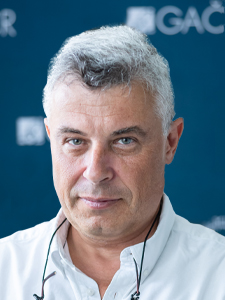We are extending the deadline for nominations of experts for the following Technical Science panels:
- P102 Electrical and electronic engineering
- P106 Chemical engineering
- P108 Organic materials and biomaterials science and engineering
Nominations can be submitted until 31 January 2025. The term of office of the selected panel members will start in April 2025.

Mathematics is often perceived as an impersonal and detached science full of formulas and numbers. Samuel Braunfeld from the Faculty of Mathematics and Physics at Charles University, a JUNIOR STAR project investigator, sees mathematics differently. He sees it as a fascinating world where language and logic intersect to reveal complex structures that affect our everyday lives. His research combines abstract model theory with the practical study of complex networks such as computer systems, social networks or biological structures. The results of his work can provide not only new theoretical insights but also practical solutions for data management and information processing.
Samuel Braunfeld’s path to the study of mathematics was complicated. At one time, he even considered studying literature. Eventually, however, he became fascinated by mathematics, which he saw as a never-ending intellectual challenge. In particular, his curiosity was aroused by model theory. “Model theory is captivating because it focuses on language and interpretation,” says the researcher. “It’s like being part of a joke where you keep interpreting the language differently than you intended, and at the end you get to a proof that surprises you.” It is this combination of clear logical structure and creative thinking that forms the backbone of his current research.
Model theory as a key to decoding networks
In his JUNIOR STAR project, he explores how model theory could be applied to different types of networks. These are found all around us – from the web of interpersonal relationships, to complex computer systems, to biological processes in our bodies.
Although at first glance these networks may seem very different, his hypothesis is simple: each network can be classified into one of two categories. Either it is so structured that it can be divided into simpler parts that communicate easily, or it is so complex that no simplistic analysis is appropriate. “There is no middle ground – either the network breaks down into clear components or it is so complex that we have to treat it as a whole,” says Braunfeld.

Efficient representation of networks
If the hypothesis is confirmed, the research could make a significant contribution to understanding how and when networks can be efficiently operated and stored with minimal demands on capacity and time. The results of the project will not only deepen understanding of the relationship between seemingly distant disciplines – model theory and combinatorics – but may also influence other fields.
A key goal of the project is to determine when networks are simple enough for further processing. “The research will provide crucial insights into the environments in which specific programming techniques can work effectively,” explains Dr. Braunfeld. These insights are important for the development of computer science and the management of big data systems.
New team works with experts from Europe and the USA
His research also has an international overlap. Dr. Braunfeld works with experts from Europe and the USA. His experience from different research environments helps him not only in his scientific work on the project, but also in leading his own team, which he has assembled thanks to the support of GACR. “Leading a team is a new challenge for me, but also an opportunity to support young researchers and help them develop their own ideas,” he adds with enthusiasm.

Samuel Walker Braunfeld, Ph.D.
JUNIOR STAR
JUNIOR STAR grants are intended for excellent early career scientists who have received their Ph.D. less than 8 years ago and who have already published in prestigious international journals and have significant international experience. With five-year funding of up to 25 million CZK, JUNIOR STAR grants allow for scientific independence and the eventual establishment of their own research group. Only a fraction of submitted projects will be supported. For 2024, only 17 out of 175 project proposals were supported.
Prof. Milan Jirsa, renowned clinical biochemist, has been appointed by the Czech Government today to head the Czech Science Foundation (GACR). He replaces Prof. Petr Baldrian after the completion of his second term. Prof. Jirsa’s main priorities include launching and preparing new grant schemes, establishing new international relationships, and stabilising the budget.
“The purpose of GACR is to support cutting-edge basic research and the scientists who carry it out. I plan to build on the work started with my colleagues in the Presidium, and to further develop GACR’s activities. My goals include the launch the first ever Restart Grants scheme, which will facilitate the return of excellent researchers to science, e.g. after parental leave, and to encourage a greater return on investment in basic research through the new Proof of Concept grant scheme,” says the incoming GACR President, Prof. Milan Jirsa, summarising his plans: “But there are more tasks ahead of me: for example, to push for the continuation of the highly selective EXPRO scheme, to start scientific cooperation with an Israeli grant provider, and to ensure sufficient funding for the traditional grant schemes of the Czech Science Foundation”.
“Professor Jirsa is a renowned expert in the field of medical sciences – he is credited with fundamental discoveries in the field of hereditary hepatitis and other liver diseases, having received numerous awards. He has served on the GACR Presidium since 2021. He also has a wealth of experience from management positions at IKEM and on the scientific boards of other institutions, which he will certainly leverage in his leadership of the Czech Science Foundation,” summarises Prof. Petr Baldrian, the outgoing President.
Having received his nomination by the Council for Research, Development and Innovation, Prof. Milan Jirsa has been appointed by the Czech Government to head the Czech Science Foundation. He currently works at IKEM and at the First Faculty of Medicine of Charles University. He also has experience in GACR evaluation panels, including assessments of project proposals for funding.
Along with Prof. Jirsa’s appointment, Prof. Patrik Španěl has been appointed GACR Presidium member in charge of Agricultural and Biological-Environmental Sciences, previously headed by Prof. Petr Baldrian within the Presidium.
About GACR Presidium
The GACR Presidium is appointed by the Government of the Czech Republic upon the nominations of the Council for Research, Development and Innovation. It is composed of five members representing the five basic scientific disciplines – Technical Sciences, Physical Sciences, Medical and Biological Sciences, Social Sciences and Humanities, and Agricultural and Biological-Environmental Sciences. The term in office of the members of the Presidium is four years, with a maximum of two consecutive terms. The President is the chief executive in charge of the Czech Science Foundation. The Presidium approves the launch of public research and development calls and tenders, and decides on the execution of funding contracts, i.e. the award of grants to scientific projects, based on the evaluations by GACR’s discipline committees and panels. The Presidium also coordinates the activities of the above advisory bodies, and appoints and removes their members.

prof. MUDr. Mgr. Milan Jirsa, CSc.
(new President of the Czech Science Foundation)
Professor Milan Jirsa is the Head of the Laboratory of Experimental Hepatology and Deputy Director of the Experimental Medicine Centre at IKEM, where he is also the Chair of the Scientific Board. At the same time, he is active as a lecturer, supervisor and member of the doctoral study committee at Charles University, as well as at the University of Chemical Technology. He is a graduate of the Faculty of General Medicine and Faculty of Science of Charles University. He was awarded his professorship at the First Faculty of Medicine, Charles University. After achieving specialized qualifications in clinical biochemistry, he began to work on photodynamic therapy of tumors, soon moving on to the study of disorders and molecular mechanisms of bile secretion. Prof. Jirsa gradually extended his interest to liver disease genetics. Over the course of his scientific career to date, he has published more than 80 original research papers in international journals and supervised a number of PhD students and postdocs. Prof. Jirsa completed a long-term residency at the Academisch Medisch Centrum in Amsterdam. He serves on the scientific boards of IKEM, the Faculty of Health Care at the Prešov University (Slovakia), and the Crigler-Najjar Stichting in the Netherlands. He received awards from the Czech Hepatological Society of the J.E. Purkyně Czech Medical Association, has become an honorary member of the Czech Society of Clinical Biochemistry, and received The Bares Award. In November 2021, he became a member of the GACR Presidium in charge of Medical and Biological Sciences. Now in January 2025, he assumes the position of GACR President.
 RNDr. Patrik Španěl, Dr. Rer. Nat
RNDr. Patrik Španěl, Dr. Rer. Nat
(new member of the Presidium of the GAČR for Agricultural and Biological-Environmental Sciences)
RNDr. Patrik Španěl, Dr. Rer. Nat., studied plasma physics at the Faculty of Mathematics and Physics, Charles University, and obtained a doctoral degree in ion physics in Innsbruck. He conducts research on ion-molecule reactions in the gas phase, with a focus on using mass spectrometry for trace gas analysis. He played a key role in developing the SIFT–MS method, which is used in the semiconductor and pharmaceutical industries. He is actively applying this method in various interdisciplinary fields, including biological, environmental, veterinary, food, and medical research. He serves as the department head, chairman of the board and vice-director at the J. Heyrovský Institute of Physical Chemistry of the CAS. He is also a professor at Imperial College London and the author of >300 publications with >13,000 citations. He previously served at the Czech Science Foundation as a member of panel 206 and as chairman of OK2.




 RNDr. Patrik Španěl, Dr. Rer. Nat
RNDr. Patrik Španěl, Dr. Rer. Nat